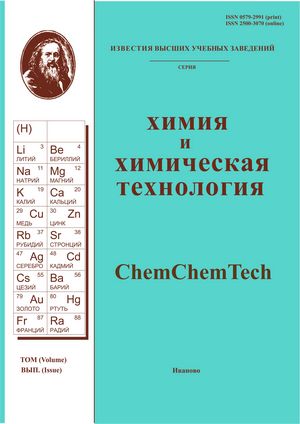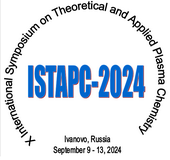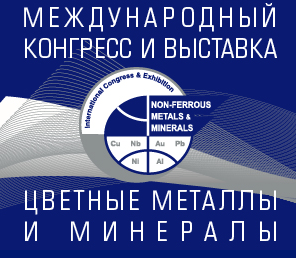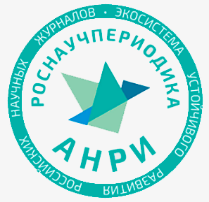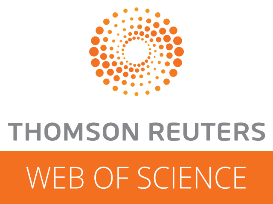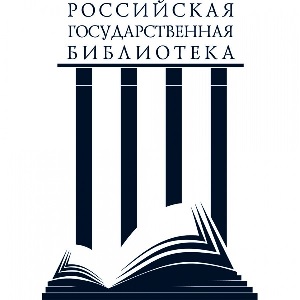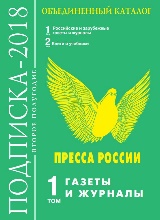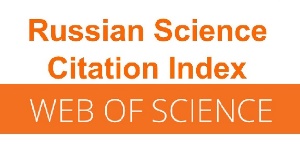ИССЛЕДОВАНИЕ АДСОРБЦИИ ДИОКСИДА УГЛЕРОДА НА ХРОМОКСИДНОМ КАТАЛИЗАТОРЕ ПО НЕСТАЦИОНАРНЫМ КОНЦЕНТРАЦИЯМ
Аннотация
Исследование закономерностей осуществления химических процессов не только вблизи, но и вдали от стационарного состояния, несет дополнительную информацию об их механизмах. В данной статье приведен новый метод оценки констант скоростей процессов адсорбции-десорбции по экспериментально измеренным значениям нестационарных концентраций адсорбирующегося вещества, основанный на расчете мгновенных скоростей процесса адсорбции (или десорбции). Этот метод позволяет связать неизвестные кинетические параметры адсорбции (десорбции) вещества на поверхности катализатора для различных наиболее вероятных предполагаемых механизмов их протекания с расчетными значениями мгновенных скоростей процессов адсорбции-десорбции. Как следствие, метод позволяет решать два типа обратных задач химической кинетики: рассчитывать точечные и интервальные значения констант скоростей адсорбции и десорбции; определять наиболее вероятный механизм из нескольких предполагаемых механизмов осуществления этих процессов. С использованием этого метода по нестационарным экспериментальным данным об адсорбции определены точечные и интервальные значения констант скоростей адсорбции и десорбции диоксида углерода в предположении его адсорбции на хромоксидном нанесенном катализаторе по трем предполагаемым механизмам: линейному, бимолекулярному и диссоциативному. По результатам расчетов восстановлены соответствующие нестационарные зависимости адсорбции диоксида углерода, которые сопоставлены с экспериментальными данными. Полученные результаты подтверждают, что ранее установленный диссоциативный механизм адсорбции диоксида углерода на хромоксидном катализаторе является наиболее вероятным. Разработанный простой метод не требует применения сложных оптимизационных вычислений и может быть использован при решении обратной задачи химической кинетики, связанной с определением механизмов и оценкой значений констант скоростей адсорбции и десорбции веществ на различных катализаторах.
Для цитирования:
Кольцов Н.И., Федотов В.Х. Исследование адсорбции диоксида углерода на хромоксидном катализаторе по нестационарным концентрациям. Изв. вузов. Химияихим. технология. 2018. Т. 61. Вып. 7. С. 37-42
Литература
Ismagilova A.S., Spivak S.I. Inverse problems of chemical kinetics, Saarbrucken: Lap Lambert Academic Publishingю 2013. 118 p.
Alekseev B.V., Koltsov N.I. Estimation of nonlinear relaxations of catalytic reactions. React. Kinet. Catal. Lett. 1984. V. 24. N 3-4. P. 309-314.
Kol'tsov N.I., Fedotov V.Kh., Alekseev B.V. Relaxation, multiplicity and auto-oscillations in the kinetics of catalytic reactions. Kinetika i Kataliz. 1995. V. 36. N 1. P. 51-59 (in Russian).
Bykov V.I., Tsybenova S.B. Nonlinear models of chemical kinetics. M.: Krasand. 2011. 400 p. (in Russian).
Fedotov V.Kh., Kol'tsov N.I. Estimates of nonlinear relaxation times of catalytic reactions. Izv. Vyssh. Uchebn. Zaved. Khim. Khim. Tekhnol. 2014. V. 57. N 2. P. 63-67 (in Russian).
Fedotov V.Kh., Kol'tsov N.I. Estimates of the relaxation times of multi-route catalytic reactions. Khim. Fizika. 2014. V. 33. N 6. P. 18-26 (in Russian).
Kol'tsov N.I. Mathematical modeling of catalytic reactions. Cheboksary: Publishing House of the Chuvash University Press. 2007. 294 p. (in Russian).
Fedotov V.Kh., Kol'tsov N.I. Method of solving the inverse problem of chemical kinetics for catalytic reactions in which each step involves main reactants. Russ. J. Phys. Chem. B. 2016. V. 10. N 5. P. 753–759.
Fedotov V.Kh., Kol'tsov N.I., Gaidai N.A., Agafonov Yu.A., Botavina M.A., Lapidus A.L. Study of carbon dioxide adsorp-tion on chromium oxide and gallium oxide catalysts on the basis of linear relaxation times. J. Appl. Chem. 2016. V. 89. N 5. P. 719-726.
Kol'tsov N.I. Investigation of the adsorption of carbon dioxide on chromium and gallium oxide catalysts by nonlinear relaxation times. Izv. Vyssh. Uchebn. Zaved. Khim. Khim. Tekhnol. 2018. V. 61. N 2. P. 46-52. (in Russian). DOI: 10.6060/tcct.20186102.5584.
Tekehira K., Ohishi Y., Shishido T., Kawabata T., Takaki K., Zhang Q., Wang Y. Behavior of active sites on Cr-MCM-41 catalysts during the dehydrogenation of propane with СО2. J. Catal. 2004. V. 224. P. 404-416.
Ostrovskii V.E., Agafonov Yu.A., Gostev B.V., Kadyshevich E.A. Lapidus A.L. Chemisorption of gases and reaction of propane dehydration at chromic oxide. Solid Fuel Chem. 2010. V. 44. N 4. P. 275–286.
Botavina M.A., Evangelisti C., Agafonov Yu.A., Gaidai N.A., Panziera N., Lapidus A.L., Martra G. CrOx/SiO2 catalysts prepared by metal vapour synthesis: physical-chemical characterisation and functional testing in oxidative dehydrogenation of pro-pane. Chem. Eng. J. 2011. V. 166. P. 1132–1138.
Lapidus A.L., Agafonov Yu.A., Gaidai N.A., Nekrasov N.V., Menshova M.V., Kunusova R.M. Dehydrogenation of pro-pane in the presence of carbon dioxide over chromium and gallium oxides. Catalysts Innovative Applications in Petrochemistry and Refining. DGMK Conference October 4–6, 2011. Dresden, Germany. 2011. P. 201-210.
Lapidus A.L., Gaidai N.A., Nekrasov N.V., Agafonov Yu.A., Botavina M.A. Kinetics of propane dehydrogenation in СО2 presence over chromium and gallium oxide catalysts based on MCM-41. Reducing the carbon footprint of fuels and petrochemi-cals. DGMK сonference October 8 – 10, 2012. Berlin, Germany. 2012. P. 181-188.
Lapidus. A.L., Agafonov Yu.A., Gaiydaiy N.A., Trushin D.V., Nekrasov N.V. Effect of introduction of alkaline promoters in oxide-chromium catalysts of propane dehydrogenation in the presence of СО2. Khimia Tverdogo Topliva. 2012. N 1. P. 22-31 (in Russian).
Michorczyk P., Pietrzyk P., Ogonowski J. Preparation and characterization of SBA-1-supported chromium oxide catalysts for assisted dehydrogenation of propane. Micropor. Mesopor. Materials. 2012. V. 161. P. 56-66.
Agafonov Yu.A., Gaiydaiy N.A., Lapidus A.L. Influence of the conditions for the preparation of CrOx/SiO2 catalysts on their efficiency in the dehydrogenation of propane in the presence of CO2. Izv. Akademii Nauk. Ser. Khim. 2014. N 2. P. 381–388 (in Russian).
Botavina M.A., Agafonov Yu.A., Gaidai N.A., Groppo E., Cortés Corberán V., Lapidus A., Martra G. Towards efficient catalysts for the oxidative dehydrogenation of propane in the presence of СО2: Cr/SiO2 systems prepared by direct hydrothermal synthesis. Catal. Sci. Technol. 2016. V. 6. P.840-850.
Atanga M.A., Jawad A., Fitch M., Rownaghi A.A. Oxidative dehydrogenation of propane to propylene with carbon dioxide. Appl. Catal. B. 2018. V. 220. P. 429-445.

